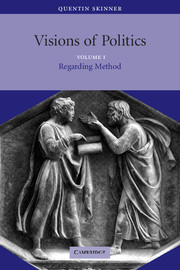Book contents
- Frontmatter
- Contents
- General preface
- Full Contents: Volumes 1–3
- Acknowledgements
- Conventions
- 1 Introduction : Seeing things their way
- 2 The practice of history and the cult of the fact
- 3 Interpretation, rationality and truth
- 4 Meaning and understanding in the history of ideas
- 5 Motives, intentions and interpretation
- 6 Interpretation and the understanding of speech acts
- 7 ‘Social meaning’ and the explanation of social action
- 8 Moral principles and social change
- 9 The idea of a cultural lexicon
- 10 Retrospect : Studying rhetoric and conceptual change
- Bibliography
- Index
5 - Motives, intentions and interpretation
Published online by Cambridge University Press: 05 September 2012
- Frontmatter
- Contents
- General preface
- Full Contents: Volumes 1–3
- Acknowledgements
- Conventions
- 1 Introduction : Seeing things their way
- 2 The practice of history and the cult of the fact
- 3 Interpretation, rationality and truth
- 4 Meaning and understanding in the history of ideas
- 5 Motives, intentions and interpretation
- 6 Interpretation and the understanding of speech acts
- 7 ‘Social meaning’ and the explanation of social action
- 8 Moral principles and social change
- 9 The idea of a cultural lexicon
- 10 Retrospect : Studying rhetoric and conceptual change
- Bibliography
- Index
Summary
We live in post-modern times (I am not the first to notice this) and one of the more challenging features of post-modern culture has been a deepened scepticism about the traditional humanist project of interpreting texts. Given this development, it seems well worth asking anew how far it remains defensible to speak – as I have done with some confidence in chapter 4 – of recovering the motives and intentions of authors, of ascribing particular meanings to their utterances, and of distinguishing acceptable from unacceptable readings of literary or philosophical texts. This is the far from modest task on which I shall now attempt to make a modest start.
It is not difficult in retrospect to pick out a number of different schools of thought that converged on the conclusion that questions about authors, intentions and the meanings of texts ought no longer to be asked. The exponents of the New Criticism spearheaded an influential attack on the idea of recovering authorial intentionality when they declared that any such project will inescapably involve us in a fallacious form of reasoning. As Wimsatt and Beardsley proclaimed in their classic article on the alleged intentional fallacy, ‘the design or intention of the author is neither available nor desirable’ as a guide to recovering the meaning of a literary text. Soon afterwards a yet more lethal attack was launched by Roland Barthes and Michel Foucault when they jointly announced the death of the author, thereby burying the time-honoured dwelling-place of motives and intentionality.
- Type
- Chapter
- Information
- Visions of Politics , pp. 90 - 102Publisher: Cambridge University PressPrint publication year: 2002
- 1
- Cited by



